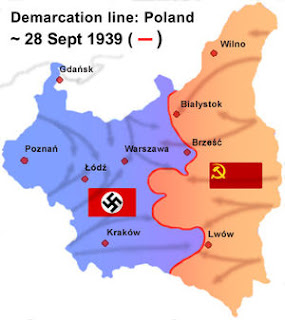Eighty years ago, all the isms become wasms
Before Europe strode forward into
the new, twentieth century horrors of its own making, it took a step back to
the diplomacy of the eighteenth century. Just as the “diplomatic revolution”
immediately before the Seven Years war in 1756 saw traditional alliances
overthrown, the German-Soviet “Non Aggression Pact” changed the face of the European
political chess board. The move was all the more astonishing as it overrode the
long-standing ideological hostility between capitalist Fascism and socialist
Stalinism. In the words of a wag at the British foreign Office “all the isms had
become wasms.” It should not have come as a surprise; the dilatory and uncommitted
British attempts to build a front against Hitler with the Soviet Union had
served to do little beyond convincing Stalin that Hitler spoke the same
language as he did and that Chamberlain didn’t. The totalitarian dictatorships
had far more in common than seemed outwardly possible. Hitler had long ago destroyed any form of socialism in Germany so the
Nazi hostility to Bolshevism served no more than rhetorical purposes. At the level
of brutal power politics where Stalin and Hitler operated, the minimal morality
of inter-state relations of two centuries was the norm. The clauses of the Pact
which partitioned Poland between the Soviet Union and Germany were secret, but
it was obvious that Hitler was being given a free hand to the East. In another
echo of the eighteenth century when three successive partitions had divided
Poland between Austria, Germany and Russia, Poland was doomed.
Hitler summoned his military
leaders to Bavaria for him to brief them on his determination to destroy Poland
by military force. The previous year Chamberlain had deprived him of the
pleasure of destroying Czechoslovakia; this time there would be no repetition. Hitler
knew that he faced no serious opposition from the west; he had seen the statesmen
of Britain and France at Munich and they were pathetic little worms (armselige
Würmchen).
The British façade of business as
usual collapsed. First Chamberlain returned from his fishing holiday at the
luxurious Scottish property of the ferociously anti-Semitic Duke of Westminster
for an urgent meeting of the Cabinet. Next, Parliament was recalled for a “Special
Session.” This made a mockery of Chamberlain’s resolute insistence on sticking
to the practice of a long parliamentary recess in the final, fraught debate of
the summer session barely three weeks before. Then, his huge majority had
allowed him contemptuously to dismiss calls by Winston Churchill and others for only a brief vacation given the huge crisis that face Europe. Chamberlain had swallowed the barely credible claim which Hitler had fed to him via one of unofficial intermediaries on whom Downing Street had come to rely, that he was in no hurry to settle the Danzig crisis.




Comments
Post a Comment